#and while i think thor ragnarok was very funny it was tonally so different from the loki i loved back in the day … idk idk
Explore tagged Tumblr posts
Text
reading thorki fic for the first time (always wanted to secretly in my heart but had a mental block until now #thankswincest) and a lot of them were written 2011/2012 and it . makes me ache for old mcu … i miss you tony stark…. clint in the vents …. all the avengers living in stark towers … no endgame…. no age of ultron even…. oughhhh
#save me 2012 mcu fandom save me#i feel so NOSTALGIC!!!!!!!!!!!#i used to love loki sm#he was my baby 2012-2014#and tony!!! the light of my life !!!#and just the vibe of the old fandom#mcu now is so . dead#and corporate#and all Wrong#i hatedddddddddd the loki show they massacred my boy#and while i think thor ragnarok was very funny it was tonally so different from the loki i loved back in the day … idk idk#but i haven’t watched a single mcu project since the first season of loki#the show made me so mad i gave up on the mcu entirely#not that that took much . post endgame they were barely hanging on by a thread#sigh#anyways#just a glimpse into my dark and twisted mind#thorki#my post#not wincest#but wincest adjacent#mcu 2012
26 notes
·
View notes
Text
Saw Love and Thunder. Mild spoilers ahead.
It was fine. Not Waititi's best work, not as good as Ragnarok, but definitely an enjoyable popcorn flick.
Suffers, like many Marvel projects, from a serious difficulty taking anything seriously. Like, I'm sorry, Thor getting in a fight with his magic axe because it's jealous about him caring about Mjolnir? It's so silly and absurd that it makes it very hard for the scenes that are supposed to be powerful or poignant to work. It's this constant tonal whiplash. In one scene, Thor is having an "argument" with his axe (me and the person I watched it with disagree on this subplot; she thinks it's so stupid it's awesome; I think it's so stupid it's stupid). In the next, our protagonists are being tortured by shadow tentacle monsters. In one scene, a child uses her stuffed rabbit to annihilate hordes of monsters (monsters we're supposed to be somewhat concerned about, mind you); in the next, multiple major characters are having a battle of rhetoric for the fate of the universe while slowly dying.
Guardians of the Galaxy and its sequel managed this tightrope walk between lighthearted humor and heavy subject matter well. Love and Thunder does not, and suffers as a result. The individual scenes are all pretty excellent - I gripe about the rabbit scene in the overall structure but as an individual scene it's absolutely amazing - but they tend not to cohere very well, particularly with the "Natalie Portman has stage 4 cancer and is not handling it well" subplot.
On the level of individual scenes, I have to critique most of the fight scenes. For most of the movie up until the end of act 2, not a single fight feels meaningful or impactful. It's all Thor and Friends utterly demolishing endless waves of mooks and shadow monsters, none of which do anything resembling bleeding. Unless Gor is personally fighting, the stakes seem virtually nonexistent, and there's no drama. This is pretty funny in the opening fight scene, establishing just how much Thor out lasses the Guardians in terms of raw strength, but it just keeps happening long after it stops being an interesting setup.
So what does work?
Well, the "Thor is an emotionally unstable dick who his friends are entirely right to hate" opening is extremely well done. Gor is a great villain (who belongs in a movie that takes itself far more seriously) and owns basically every scene he's in. The beat where Thor gets stripped naked and Zeus's female entourage faints is just absolutely hilarious; yes, Chris Hemsworth is a very sexy man, glad we got that settled. The aforementioned bunny rabbit scene is incredible. While the cast talking up the movie as "super queer" is a very obvious lie, the few small gay scenes, particularly Valkyrie flirting with one of Zeus's entourage, are tasteful and fun. The ending is poignant and heavy and, again, belongs in an entirely different movie from the aforementioned (and genuinely incredible) bunny rabbit scene. Matt Damon's cameo is incredible.
More generally, Taika Waititi's direction shines through. The visuals are excellent and when the movie is allowed to be silly and camp, it looks, sounds, and feels incredible. The vibes are immaculate. Also, it's a bit of a cheap shot for the soundtrack to be mostly Guns And Roses classics, but I am nothing if not a sucker for badass action scenes set to Paradise City. Sue me. It works.
So yeah. Lots of excellent pieces that don't quite fit together, a lot of good actors putting in solid performances, a soundtrack that's just barely on the right side of cliché, no handjobs for the US military-industrial complex, Chris Pratt disappears from the plot after about five minutes, which is about as much Chris Pratt as I'm interested in tolerating these days... It's not bad! It's a perfectly serviceable blockbuster.
It's also gonna be the last Marvel film I watch for a good long while, because throughout the entire movie, I couldn't help but notice those little critiques niggling at me. It's impossible to take anything seriously when everyone's response to everything is witty quips. People don't actually talk or act like that, to an embarrassing degree. There's an attempt to raise the stakes by doing something truly horrific, but we never grapple with any of the consequences or tragedy of that event, and you could have replaced it with Gor stealing Thor's favorite irreplaceable Macguffin for all the impact on the story it ends up having. In other words: it's a Marvel movie, with all that entails. As lovely as Taika Waititi's sensibilities and visual direction are, the fact is we've been here before a few too many times.
As I watched the small city worth of people who worked on this thing roll by in the credits, I couldn't shake the feeling that the Marvel formula has, at long last, become stale. The committee design has run out of ideas. The crowning moments of awesome can't distract me from how shallow and incongruous the whole is. Your flying screaming goats are but yet another plaything in the infinite sandbox of bored, apathetic gods, and I don't care if this gets me uninvited from the Orgy.
6 notes
·
View notes
Text
Lessons for the MonsterVerse
by Bunnypwn Gold
I have always been a big fan of Godzilla. I’ve been watching the movies since I was a kid. Now that they’re making new movies again, there’s a lot to be excited about and look forward to. Recently, I re-watched the newest one from the American MonsterVerse, Godzilla: King of the Monsters, as well as the last film from the Millennium era, Godzilla: Final Wars. Both films are big, ambitious, and include some major flaws, one of which they have in common, or at least they have flaws with overlap. While the MonsterVerse, so far, is great and is on track to continue that trend, Final Wars suffered greatest from this shared flaw, and so I am here to set out what the MonsterVerse needs to do to avoid self-destruction: take itself seriously.

Briefly, I want to provide a review and synopsis of King of the Monsters. So spoilers, it’s really good. Five years after Godzilla made landfall in San Francisco and fought against the parasitic MUTOs, Monarch is struggling to figure out what it wants to do with the Titans, as the monsters are now known, while the government and military are pressuring Monarch to kill them all. At the same time, one of their own scientists, Emma Russell, betrays them to assist ecoterrorist Alan Jonah in awakening the Titans with a bioacoustics device called the ORCA so that the Titans can spur regrowth in the environment and undo anthropogenic climate change. They revive Ghidorah in Antarctica, who then awakens all the other Titans still sleeping around the world at once, thus precipitating a conflict with Monarch and Godzilla for the crown. The film sets out to cover a lot of narrative ground while introducing several important elements to the series, and all the while it held together some solid character work for its main cast. Based on the new, expansive mythos that this film lays out—with the many new Titans and the abandoned Hollow Earth society discovered in vast underground caverns which used to live in harmony with the Titans—it looks like things will only get more exciting, and the future of the MonsterVerse is set out effectively and in grand style.
Godzilla: Final Wars is also about a large amount of monsters fighting for control of the Earth, feature monsters trapped in Antarctic ice, and ends with Godzilla fighting Ghidorah, but that’s where the similarities end. Final Wars was released in 2004 as the commemorative 50th anniversary film for the franchise. In it, the Earth has been defended from monsters for decades by the Earth Defense Force, who managed to trap Godzilla in ice in Antarctica years prior. All the other monsters around the world attack at once in the present, and the EDF was unable to keep up until the Xiliens arrived from space, removing the monsters and promising to make a peaceful alliance with humanity. In reality, the Xiliens were invading the Earth in order to herd humans like cattle because they need to eat human mitochondria to survive, and they were secretly controlling the monsters. So the heroes free Godzilla so he can help them fight the aliens and their army of brainwashed monsters. The plot also involved mutant humans and a fake rogue planet that was also somehow an actual asteroid that Godzilla later blows up. It’s a mess of a movie. That aside, it’s clear the film is trying to borrow elements from the three previous eras of Godzilla movies. It took an edgier look from the majority of the Millennium movies (from 1999-2004). The use of serious, formidable super vehicles is like the various super planes from the Heisei era films (1984-1995). However, the element borrowed from the Showa era films (1954-1975) is where it falters: campiness. The difference in this film compared to the Showa films being that they purposefully made Final Wars campy, despite the opportunity they had and despite the tone of the Showa era movies.
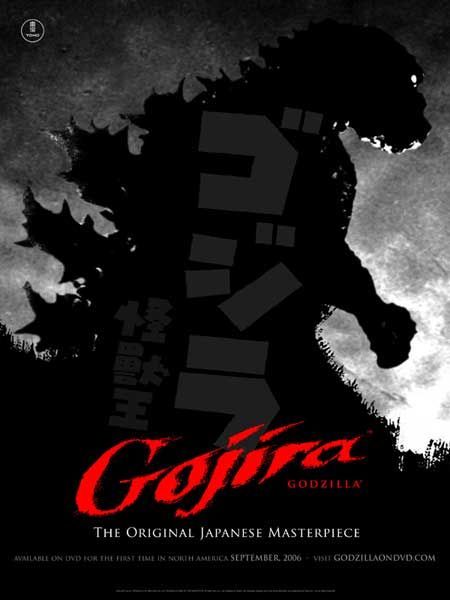
The original film, Gojira, is a very serious and tonally heavy film depicting the horrors of the modern era, with rapid industrialization in post-war Japan, the advent of the Cold War arms race, and the reason for that arms race, nuclear weapons, with the one man capable of killing Godzilla horrified by the devastation such an ability would grant. This movie and its first sequel were the only Godzilla films made in black and white, which impacts the way they look and how their special effects come across. After a several year hiatus, Godzilla returned to the screen to fight King Kong, this time in color. Seeing those monster suits and the limited special effects capabilities in 1960 of a B-list sci-fi flick in color really emphasizes how phony it all looked at the time. Throughout the Showa era, Godzilla shifted from an entirely villainous character to an erstwhile hero, and though the movies never stopped being presented as dramatic, they were made with an acknowledgement of how they look despite the drama and seriousness the creators otherwise wanted them to have.
Over time, of course, special effects improved. Starting with the Heisei era of films, Toho was able to produce much better suits and visual effects, and so they resumed making their movies with the kind of drama and seriousness that they had wanted all along. The Millennium era began in response to the 1998 American Godzilla, which depicted the titular monster with CGI, in contrast to the Toho tradition of using suits. The Millennium era was the last hurrah to suitmation effects, and these films, overall, looked great, probably the best that a giant monster movie can look with people in suits. Accordingly, they also hold up the more dramatic tone of the Heisei era while allowing each creative team the freedom to make the standalone Godzilla movie they wanted to make. The exception to this is Final Wars, which, as previously said, was not serious at all. Despite the successes of making serious, dramatic monster movies since 1984 and the ambitions of the Showa era’s large and imaginative canon, Final Wars decided to celebrate five decades of filmmaking by using cheesy comedy, camera work that screams “we had to edit heavily to make our actors look like action stars,” and what may very well be the least convincing acting of the entire series. The only person on set who seemed to understand any of this is alien commander X, who looked like he was being goofy on purpose, instead of on accident like the rest of the cast. Final Wars had the same opportunity as the rest of the Millennium era had to present a serious, dramatic battle for the fate of the Earth, and wasted it with aliens that seem completely unqualified to invade another planet and cramming most of their monsters into throwaway fights with Godzilla that lasted on average less than a minute.
This purposeful camp and goofiness of Final Wars is presumably meant to provide a lightness and humor to the film. This is where it overlaps with King of the Monsters, which ventured into the modern era of ironic, self-aware humor to provide levity. Borrowing from the MCU, King of the Monsters cracks wise during dramatic moments relatively often, in an attempt to lighten them up. Unfortunately, the jokes they go with are the weakest material in the film, and they do more to undermine the dramatic tension than enhance the film or provide levity. It’s like the scene in Thor: Ragnarok when Korg says they can rebuild Asgard, and then it blows up more, so never mind; or Hawkeye explaining how ridiculous his fighting robots with a bow and arrow is to Scarlet Witch in Age of Ultron. Maybe those are funny jokes, but they do more to undermine the dramatic tension than they add in humor, and both have the capacity to turn parts of the audience off by poking holes in the premise. It’s rather insecure and shows a lack of confidence in the work to stand on its own merits despite critics or easy jokes from the peanut gallery. This brand of humor gave us moments in King of the Monsters like Sam Coleman mishearing Ilene Chen saying “Ghidorah” as “gonorrhea.” It’s really not that funny, it wasn’t a moment that needed lightening up, and there’s no reason he would have misheard her since he was standing within ten feet. It ultimately undermines a moment in the film for an Asian woman to demonstrate her expertise by locating vital information about the threat at hand. But yes, Sam, I guess monsters sometimes have slightly silly-sounding names, like Ghidorah, which is based on the Japanese pronunciation of hydra, a very popular and well-respected mythical dragon.
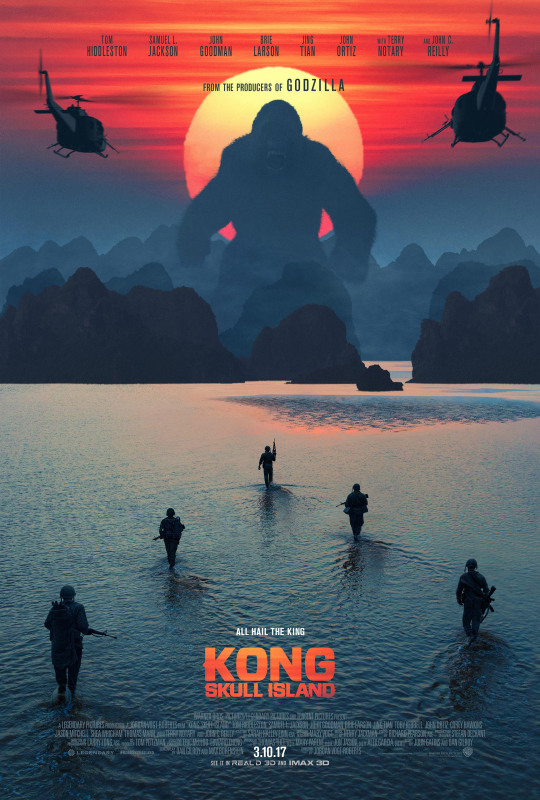
The 2014 Godzilla film that started the MonsterVerse was enjoyable, but didn’t quite live up to its potential. That’s part of the reason I delayed seeing Kong: Skull Island far longer than I should have. When I did see it, I was amazed. I expected it to be good, and I heard great things about it, but it was far better than anything I could have imagined it to be. It was a truly great movie. After seeing it, my hopes and expectations for the MonsterVerse skyrocketed. I don’t think these expectations have been let down yet, and I expect them to be satisfied moving forward. However, the one thing I wanted most going into King of the Monsters was for them to lean into the tone and style of Skull Island more. In certain respects, I think they did, and the ambitious mythos being built here is far more substantial than anything in the Godzilla franchise so far, which usually has stuck to “monsters keep showing up and fighting.” The dramatically absurd tone, though, was what they lost by using the ridiculousness of what’s happening to make quick, weak, sometimes self-aware jokes instead of to highlight the intensity of the drama experienced by the characters. In Skull Island, when the squad had to fly their planes through a permanent thunderstorm, Sam Jackson’s character started quoting a speech about how the righteous men will win by not backing down and so inherit the Earth. The speech makes the whole thing feel even more ridiculous than a permanent thunderstorm already is, and in doing so amps up the drama and tension. This ultimately makes the arrival of a giant gorilla, which the audience is expecting to see, much more impressive and intense. That’s what I wanted for King of the Monsters. Yes, there are ridiculous aspects to giant monster movies, but the characters are living it, not watching it and thinking, “This crazy.”
Having this more serious tone is also important in really hitting the audience with the larger thematic power of the film. In Skull Island, the way Sam Jackson didn’t want to back down from killing Kong, even after seeing that it’s pointless and even detrimental to the troop, is reminiscent of the way America is currently stuck in multiple seemingly never-ending wars. At least part of the reason people don’t want to leave Iraq and Afghanistan is because they don’t want to create another Vietnam, the war that this film centers around on purpose. Having that tension of a dedicated army colonel who was just forced to “abandon” his war amplifies the drama of the other characters wanting to understand the problems of the natives and come to a real solution to their problems, and it all works because of how it resonates in the current political climate. The Godzilla side of the MonsterVerse so far is focusing on climate change, which, while abstract for far too many, is also a very real and pressing concern for a lot of people, paralyzing at times. Seeing the dramatic steps needed to fix the problem almost makes Alan and Emma’s plan in King of the Monsters feel heroic. The film is filled with images of crumbling, flooded American cities, and Ghidorah, an alien creating imbalance in nature a la humanity thinking itself separate from nature, is literally a living hurricane. There’s a lot of strong, serious, intense potential to make such a movie really meaningful. If they had taken themselves more seriously, it would have had this level of impact. It really is sad that they squandered this potential on silly jokes and a story arc for their generic, useless white man hero, Mark Russell. Like I said at the beginning, it’s still a good movie, but I can so clearly see how much better it could have been, too.
To me, dramatic movies making fun of themselves in important scenes always comes across as insecure, like filmmakers can’t simply make their movie first, they also have to preempt the internet to protect their egos. As the MonsterVerse moves forward, my biggest piece of advice is to do what Skull Island did and take itself seriously. We live in a time when a lot of previously niche franchises and genres are getting more spotlight due to the demands of studios wanting more high-action, effects heavy movies to sell huge on the international market. As these genres, once mired in cultural neglect and seen as silly and childish, come into the limelight, they both prove they always were to be taken seriously and poke fun at themselves to prove they know they shouldn’t be. I get the appeal of ironic, self-aware humor and wanting to be silly at dramatic high points, because it can be very fun and, when used properly, be incredibly funny; look to Thor: Ragnarok for an overall great example. But besides issues of improper use, this kind of humor is arguably at saturation at this point. It’s being misused and overused to the detriment of otherwise good movies in an attempt to compete with Marvel, who remains the poster child on this. So MonsterVerse, let Marvel, Disney, and all those imitators try to outdo each other by proving they can make more fun of themselves before Honest Trailers get to them. Just have fun making movies about giant monsters with the kind of drama and seriousness only modern special effect can give them, and use the ridiculousness of it all to amp up that drama instead of undermine it. Get over people calling you a nerd and just do your thing. As they say, being cool is all about confidence.
#Godzilla#king of the monsters#kong#skull island#titans#ghidorah#final wars#movies#monsters#giant monsters#marvel
10 notes
·
View notes
Text
Marvel Cinematic Universe: Thor: Ragnarok (2017)
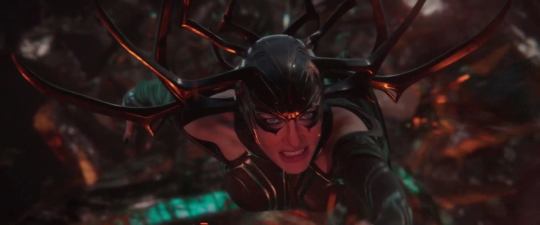
Does it pass the Bechdel Test?
No.
How many female characters (with names and lines) are there?
Four (23.52% of cast).
How many male characters (with names and lines) are there?
Thirteen.
Positive Content Rating:
Three.
General Film Quality:
Loads of fun, though tonally dissonant; works best on first viewing. Easily the superior film of the Thor franchise, though that’s not a huge achievement considering its predecessors.
MORE INFO (and potential spoilers) UNDER THE CUT:
Passing the Bechdel:
Sigh.
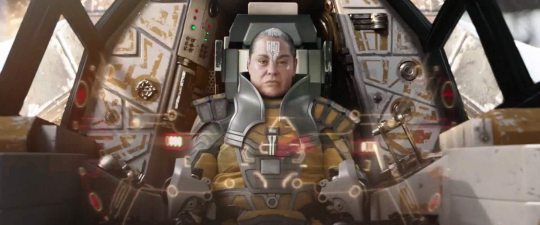
Female characters:
Hela.
Scrapper 142 (I know, she is credited as Valkyrie, but since the name is never used to address her in the film it doesn’t count by the rules of this blog; if she didn’t happen to be referred to by her scrapper number a few times, she wouldn’t count as a named character at all).
Topaz.
Natasha Romanoff.
Male characters:
Thor.
Surtur.
Skurge.
Loki.
Stephen Strange.
Odin.
Volstagg.
Hogun.
The Grandmaster.
Carlo.
Korg.
Bruce Banner.
Heimdall.
OTHER NOTES:
The use of Immigrant Song is my favourite thing about this movie, to be honest. I don’t mean that as an insult, it’s just such a good choice.
The inclusion of Doctor Strange in this film feels like a pointless misstep, a distraction at what is really a vital early point in establishing tone, especially considering this useless scene is what leads us in to...
...the literal death of Odin and introduction of Big Bad Hela, all of which should be emotional and intense and is instead flat and dissonant in the extreme. Watching this for the first time, I was very concerned that the whole film was just gonna end up gimmicky and soulless. While it does pick up, I was also not wrong about that early assessment.
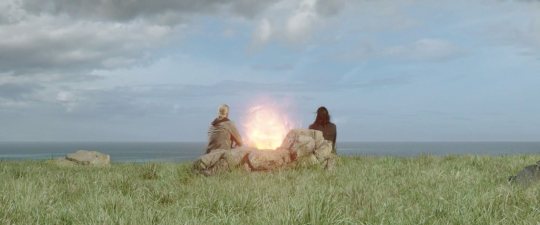
Not that I was attached to Thor’s friends from the previous films, but they sure do just kill them off without fanfare, except for Sif who just doesn’t appear at all (logically, we should assume she dies off-screen, otherwise there’s no reason for her not to be up-front with Thor at the end of the movie). Fandral doesn’t even get a line in before he croaks, that’s how irrelevant these franchise-veteran characters are. Emotional engagement in plot and character is for chumps, anyway.
*whispers* Jeff Goldblum is here.
“Piss off, ghost!”
Hulk reveal is pretty solid, if you manage not to have been spoiled (a tall order, since it was in the promos).
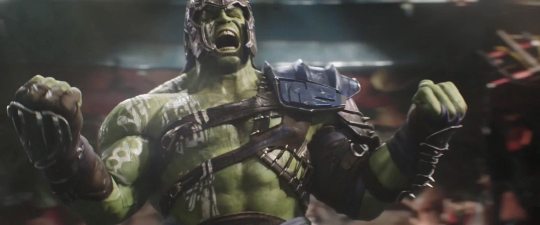
Heimdall is still the MVP of the Thor franchise.
Can’t believe it took this long for any movie to squeeze some real fun and heart out of the Hulk character. This is way better than embarrassingly forcing a love match on him.
The valkyrie-battle memory is soooo good-looking.
This movie is too recent to be using the word ‘gypsy’...
Thor’s story about Loki pretending to be a snake when they were kids is the good shit.
But, Immigrant Song is still the most inspired choice of the film. Not sorry.

So, this is one of those movies which I felt was pretty over-hyped, to be honest. It is great fun, don’t get me wrong, it’s fresh and hilarious and subversive and way the Hell better than the previous Thor films, plus it has a great cast and strong visuals and they used Immigrant Song really effectively...but the tone of the film is an absolute fucking mess, the plotting is a shambles, and there’s nowhere near as much heart and weight underpinning it all as what there should be for a movie involving the near-total destruction of an entire civilisation. The majority of the movie is handed over to a shenanigan-heavy side-plot of no consequence to the central conflict, while the central conflict - LITERAL RAGNAROK - is relegated to a handful of scenes sprinkled across the film, obliterating any chance of it seeming meaningful or even particularly serious. The strongest point of the story is the final act, once Thor and company finally get to Asgard to confront Hela, but the narrative doesn’t earn that strong finish; it just goes to show how much more engaging the rest of the film could have been if they had stayed on track.
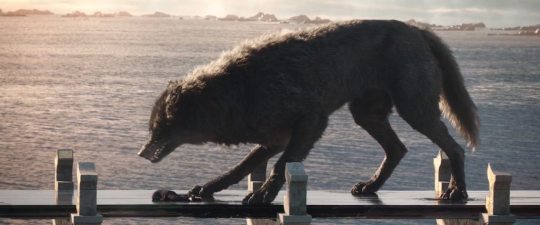
This is a big part of why this movie - while a delightful surprise on first viewing - doesn’t age particularly well on repeat; this was my fourth time through, and by the third quarter, as Sakaar draaaagged through its roster of jokes and pratfalls, my attention span was waning fast. Even if the entire garbage-planet sidebar was not distracting from what should have been a very serious main plot, I’m not sure it would remain engaging long-term, since it is rather spare and low on emotional/character investment; it’s not a pitfall of comedy that has to exist (heavily-emotional and/or dark comedies are definitely a real thing), but unfortunately, this is not a movie that is very interested in what has come before it, and it expresses that disinterest by neglecting any element of the established Thor mythology which might have brought this plot a sense of meaning. As such, rather than feeling like ‘the Thor movie that finally got it right’, it’s more like a reboot, with old characters unceremoniously ditched and any sense of purpose or import in old story threads or histories gone right alongside Asgard itself.
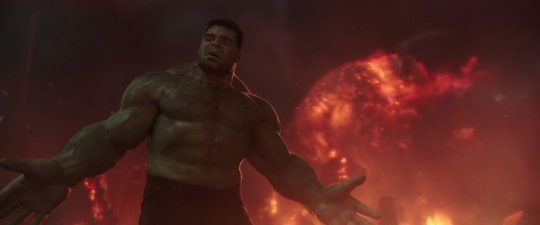
I’ve seen people praise this film for its ‘anti-Imperialism, anti-colonialism’ message, but I feel it’s a point weakly made onscreen; any depth to that argument would require a more sincere effort from the script in addressing those scant Asgard scenes, and as such, I feel that this element - though it isn’t completely wishful thinking - is much more in the eye of the beholder than it is a function of the narrative itself. The attempt to engage with any thoughtful discussion on Asgard’s legacy is a swift casualty of the film’s overall superficiality, just the same as the devastation of Asgard and the decimation of its population is blithely underplayed because, hey, Thor vs Hulk is worth way more attention than genocide, right? It’s that tonal dissonance in the two pieces of the plot which keeps me from really relaxing and enjoying the lightness, because that lightness is both excessive and out-of-place; I feel uncomfortable being asked to just shrug and go with it, I want to be emotionally involved and moved by the plight of the Asgardians, and instead I’m stuck watching Thor get a haircut and an eyeful of Hulk dick. Under almost any other circumstances, I would be all about a hard-comedy version of Thor, especially after the generic drudgery of the earlier installments in the franchise, but at the same time as Ragnarok? Not so much.
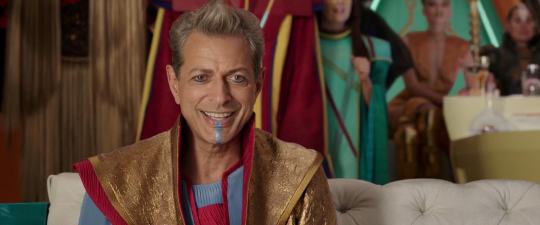
That said? This film is definitely not without quality. Comedic quality, for sure (anything with Taika Waititi’s name attached is worth a look), and there really are some great casting flourishes (though I maintain disappointment that the Asgard plot is so undersold, because it means Karl Urban and especially Cate Blanchett are under-utilised); for the interests of this blog, it’s that Scrapper 142 aka Valkyrie who forms the highlight (and she’s a worthy highlight without the context of this blog, too). Valkyrie’s drunk, angry sauntering and her snappy disregard for Thor’s righteous pontificating positions her within an archetype normally restricted to male characters only, too loose and unseemly for a female character, who might be found dislikeable and (horror of horrors) too sloppy to be sexy, whereas a man in the same archetype is funny, a ‘lovable asshole’, and the perception of his appearance is not tied up in his behaviour the same way nor is he under the same pressure to prioritise his appeal for the audience in the first place. Angry male drunkards who begrudgingly tag along with the protagonist in the end because they’re surly but not bad, those are a dime a dozen, but a woman in the same position? A rare gem indeed. And Valkyrie is more than just a fresh twist on an old cliche; her personality is grounded, it has a relatable simplicity (disillusionment with a side-order of survivor’s guilt), and there’s a confidence about the way she and the unspoken parts of her life are presented, without need to force a connection with Thor and his personal plight in order to justify Valkyrie’s actions or relevance to the plot. She’s an entirely self-contained character who could just as easily have the story to herself with no further mention of Thor et al., and that’s the hallmark of any well-constructed character: the ability to stand alone.
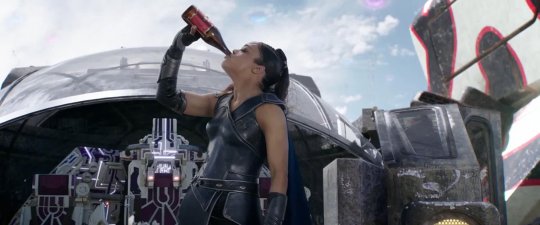
As a whole, this movie is far from bad - when I call it overrated, I am very much talking about the fact that it’s mostly a string of shenanigans with minimal narrative underpinning, and while that’s not a terrible thing in itself, I do think the hype around this movie implied that it had something more to offer than just laughs and a retro look. For me personally, the lack of emotional engagement and character stakes is close to a fatal flaw, and so while I enjoy this movie on a superficial level, it gives me nothing I need in order to really dig it (for others, obviously, this is not a problem). It always rubs me the wrong way to see something completely disavow previous chapters in the same story - there’s a big difference between developing an idea in a new direction, and simply ditching whatever you didn’t like about what came before - and I would have preferred to see this film make its changes with at least a modicum of respect for the foundations it is building upon (basic as the previous Thor films were, they weren’t catastrophic embarrassments). And yes, ultimately, the burying of the Ragnarok plot under a pile of Planet Garbage (feat. Jeff Goldblum) is just a little unforgivable in my mind, and it’s the first thing I think of whenever this film pops up; I really, really wish that Ragnarok were not part of this plot at all, that the Sakaar part of the story (i.e. the part that The Powers That Be were actually invested in, clearly) formed the bulk of the second film in the Thor franchise instead, since that movie basically sucked and took itself too seriously, and then the Thor film which took itself seriously could have been actually about Ragnarok. Basically, I wish that Marvel had gotten their shit together sooner rather than later with this part of the franchise, because while this worked out fine for them monetarily, narratively it’s just not a step I can get behind.
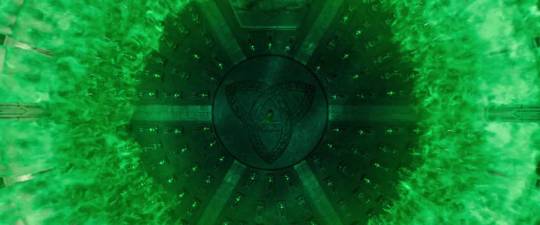
2 notes
·
View notes